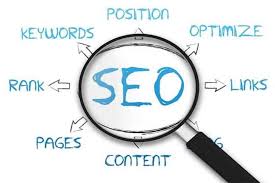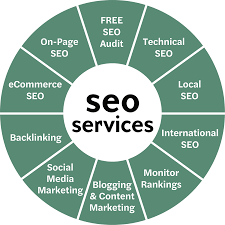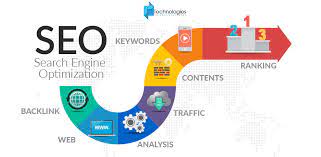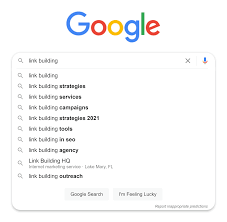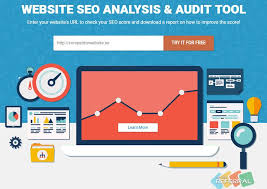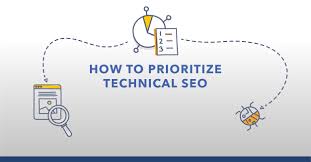The Importance of Website SEO Analysis
The Importance of Website SEO Analysis
Search Engine Optimization (SEO) is a crucial aspect of any successful online presence. It involves various strategies and techniques to improve a website’s visibility on search engine results pages. One essential component of an effective SEO strategy is conducting regular website SEO analysis.
Understanding Website SEO Analysis
Website SEO analysis is the process of evaluating various elements of a website to assess its performance in terms of search engine rankings and user experience. By conducting a comprehensive analysis, digital marketers and website owners can identify areas for improvement and develop strategies to enhance their site’s visibility and performance.
The Benefits of Website SEO Analysis
There are several benefits to conducting regular website SEO analysis:
- Identifying Strengths and Weaknesses: By analysing key metrics such as keyword rankings, backlink profile, page load speed, and user engagement, website owners can identify what is working well and areas that need improvement.
- Improving Search Engine Rankings: Through detailed analysis, it becomes easier to identify opportunities for optimising content, meta tags, images, and other elements that can positively impact search engine rankings.
- Enhancing User Experience: A thorough analysis can reveal issues that may be hindering user experience, such as broken links, slow loading times, or poor mobile responsiveness. Addressing these issues can lead to higher user satisfaction and retention.
- Staying Ahead of Competitors: By keeping track of competitors’ strategies through SEO analysis, website owners can adapt their own tactics to stay competitive in the ever-evolving digital landscape.
Tools for Website SEO Analysis
There are numerous tools available to help with website SEO analysis, including Google Analytics for tracking website traffic and user behaviour, SEMrush for keyword research and competitor analysis, Moz for backlink monitoring and site audits, and many more. These tools provide valuable insights that inform data-driven decisions to improve overall SEO performance.
In Conclusion
In conclusion, conducting regular website SEO analysis is essential for maintaining a strong online presence in today’s competitive digital environment. By identifying strengths and weaknesses, improving search engine rankings, enhancing user experience, and staying ahead of competitors through data-driven insights, website owners can effectively optimise their sites for success.
Mastering SEO: 14 Key Questions Answered for Effective Website Analysis and Optimization
- How do I check my SEO score?
- How do I find my website SEO score?
- How do I analyze SEO for my website?
- What should I look for in SEO?
- How do I audit a website for SEO?
- How do I Analyse SEO for my website?
- How do you know if a website is SEO friendly?
- How do I check my SEO ranking?
- How can I check my SEO ranking?
- How do I know if my website is good for SEO?
- What does an SEO analysis include?
- What does the SEO analysis include?
- What is good SEO score?
- How do you analyze SEO content?
How do I check my SEO score?
To check your SEO score, there are various tools available online that can provide you with valuable insights into the performance of your website. Popular tools like SEMrush, Moz, Ahrefs, and Google Search Console offer features that allow you to assess your website’s SEO health. These tools typically analyse factors such as keyword rankings, backlink profiles, site speed, mobile-friendliness, and overall site structure to generate an SEO score or grade. By utilising these tools and regularly monitoring your SEO score, you can identify areas for improvement and implement strategies to enhance your website’s visibility and ranking on search engine results pages.
How do I find my website SEO score?
To determine your website SEO score, you can utilise various online tools specifically designed for this purpose. These tools assess different aspects of your website, such as keyword usage, backlink quality, page load speed, mobile responsiveness, and overall user experience. Popular SEO analysis tools like SEMrush, Moz’s Site Explorer, Ahrefs, and Google’s PageSpeed Insights can provide valuable insights into your website’s SEO performance. By entering your website URL into these tools, you can generate a comprehensive report detailing your current SEO score and offering suggestions for improvement. Regularly monitoring and improving your website SEO score is crucial for enhancing your online visibility and driving organic traffic to your site.
How do I analyze SEO for my website?
To effectively analyse SEO for your website, start by conducting a comprehensive audit of your site’s current performance. This includes assessing key elements such as keyword usage, meta tags, backlink profile, site speed, and mobile responsiveness. Utilise tools like Google Analytics and Search Console to track website traffic and user behaviour. Perform in-depth keyword research to identify relevant terms for optimisation. Regularly monitor and analyse your competitors’ strategies to stay competitive. By focusing on these areas and leveraging data-driven insights, you can develop a robust SEO analysis strategy that enhances your website’s visibility and performance in search engine results pages.
What should I look for in SEO?
When considering what to look for in SEO, it is essential to focus on key elements that can significantly impact your website’s performance and visibility. Firstly, pay attention to relevant keywords that align with your content and target audience, as they play a crucial role in attracting organic traffic. Additionally, ensure that your website’s structure is user-friendly and optimised for search engines, including clear navigation, mobile responsiveness, and fast loading speeds. Backlinks from reputable sites can also boost your SEO efforts. Regularly monitoring and analysing your website’s performance through tools like Google Analytics can provide valuable insights for ongoing improvement. Ultimately, a holistic approach that combines quality content, technical optimisation, and strategic marketing tactics is key to achieving SEO success.
How do I audit a website for SEO?
When it comes to auditing a website for SEO, the process involves a comprehensive evaluation of various elements to assess its performance and identify areas for improvement. To audit a website effectively, start by examining key factors such as on-page SEO elements (meta tags, headings, content quality), technical aspects (site speed, mobile-friendliness, crawl errors), backlink profile, and overall user experience. Utilising tools like Google Search Console, SEMrush, or Moz can provide valuable insights into these areas. By conducting a thorough SEO audit, website owners can gain a clear understanding of their site’s strengths and weaknesses, enabling them to develop targeted strategies to enhance visibility and performance in search engine results pages.
How do I Analyse SEO for my website?
Analyzing SEO for your website involves a systematic approach to evaluating various aspects that impact your site’s visibility and performance on search engines. To begin, conduct a comprehensive keyword analysis to identify relevant keywords for your content. Next, assess your website’s on-page elements such as meta tags, headings, and content quality to ensure they are optimised for search engines. Additionally, review your backlink profile to gauge the quality and quantity of inbound links pointing to your site. Utilising tools like Google Analytics and Search Console can provide valuable insights into your website’s traffic, user behaviour, and overall performance. Regularly monitoring and adjusting these key elements based on data-driven analysis will help improve your website’s SEO and enhance its online presence.
How do you know if a website is SEO friendly?
Determining whether a website is SEO friendly involves assessing various key factors that contribute to its search engine visibility and user experience. Firstly, examining the website’s structure and navigation to ensure it is easily crawlable by search engines is crucial. Additionally, analysing the use of relevant keywords in meta tags, headings, and content helps determine if the site is optimised for search queries. Checking for mobile responsiveness, fast loading times, secure connections (HTTPS), and high-quality backlinks are also indicators of an SEO-friendly website. Conducting regular audits and monitoring performance metrics can provide valuable insights into the overall health of a website’s SEO strategy.
How do I check my SEO ranking?
To check your SEO ranking, you can use various tools and methods to assess where your website stands in search engine results pages (SERPs). One common approach is to utilise online tools like Google Search Console, SEMrush, Ahrefs, or Moz’s Rank Tracker. These tools provide insights into your website’s keyword rankings, organic traffic data, backlink profiles, and overall visibility on search engines. Additionally, manual methods such as conducting keyword searches on search engines can give you a quick snapshot of where your website appears for specific terms. Regularly monitoring and analysing your SEO ranking is crucial in understanding the effectiveness of your SEO efforts and identifying areas for improvement to enhance your online visibility.
How can I check my SEO ranking?
To check your SEO ranking, there are several methods you can employ. One common approach is to use online tools such as Google Search Console, SEMrush, or Ahrefs, which provide insights into your website’s performance in search engine results pages. By entering relevant keywords associated with your website, these tools can generate reports on your current ranking positions and track changes over time. Additionally, monitoring organic traffic and user engagement metrics through analytics platforms like Google Analytics can offer valuable indicators of your SEO ranking success. Regularly assessing these metrics and making data-informed adjustments to your SEO strategy can help improve your website’s visibility and performance in search results.
How do I know if my website is good for SEO?
To determine if your website is optimised for SEO, several key factors need to be considered. Firstly, assess your website’s loading speed and mobile responsiveness, as search engines favour fast-loading, mobile-friendly sites. Next, examine your site’s content quality, relevance of keywords, and internal linking structure to ensure they align with SEO best practices. Additionally, check for proper meta tags, alt text for images, and a clear site structure that search engine crawlers can easily navigate. Regularly monitor your website’s performance using tools like Google Analytics to track traffic, user engagement metrics, and keyword rankings. By consistently evaluating these aspects and making necessary improvements based on SEO analysis results, you can enhance your website’s SEO effectiveness and visibility in search engine results pages.
What does an SEO analysis include?
When conducting an SEO analysis for a website, various key components are typically assessed to evaluate its performance and potential for improvement. An SEO analysis includes examining factors such as keyword usage and effectiveness, website structure and navigation, content quality and relevance, backlink profile, page loading speed, mobile responsiveness, meta tags optimisation, user experience metrics, and overall search engine visibility. By analysing these elements comprehensively, digital marketers can gain valuable insights into the strengths and weaknesses of a website’s SEO strategy, allowing them to develop targeted solutions to enhance its online presence and ranking on search engine results pages.
What does the SEO analysis include?
When conducting an SEO analysis for a website, various key components are typically assessed to evaluate its overall performance and effectiveness in search engine rankings. The SEO analysis includes an examination of factors such as keyword usage and relevance, on-page optimisation elements like meta tags and headings, backlink profile quality and quantity, site speed and mobile responsiveness, content quality and relevance, user engagement metrics, and overall site structure. By delving into these aspects, website owners can gain valuable insights into areas that require improvement to enhance their site’s visibility, user experience, and ultimately achieve better search engine rankings.
What is good SEO score?
When it comes to evaluating the effectiveness of SEO efforts, one common question that arises is: “What is a good SEO score?” The answer to this question can vary depending on various factors, including the specific goals and industry of a website. In general, a good SEO score typically refers to achieving high rankings on search engine results pages (SERPs), increasing organic traffic, improving user engagement metrics, and enhancing overall website performance. While there isn’t a universal number that defines a perfect SEO score, continuous monitoring and analysis of key performance indicators can help determine the success of an SEO strategy and identify areas for further optimisation.
How do you analyze SEO content?
Analyzing SEO content involves a multifaceted approach to ensure that the content is optimised for search engines and resonates with the target audience. To analyse SEO content effectively, one must start by conducting keyword research to identify relevant and high-traffic keywords. Next, evaluating the on-page elements such as meta tags, headings, and internal linking structure is crucial to ensure proper optimisation. Additionally, assessing the quality and relevance of the content, including readability, engagement metrics, and multimedia usage, plays a vital role in determining its effectiveness. Regular monitoring of performance metrics like organic traffic, bounce rate, and conversion rates helps in refining and improving SEO content strategy over time.
